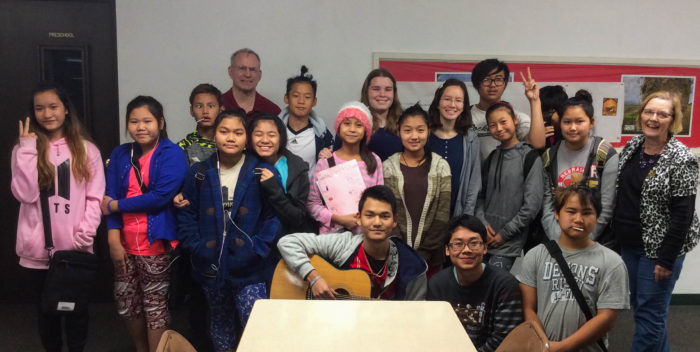A Place of Refuge: Why America Should Welcome Immigrants and Asylum Seekers
Juniors April Bayer and Emma Heidorn pose with Karen students at First Baptist Church in Lincoln.
by April Bayer
In a country plagued by political differences and social and economic disparities over the last several years, it often feels as though Americans are more divided than ever.
Throughout the second week of January, multiple news outlets reported that President Donald Trump allegedly made disparaging remarks about immigrants from Haiti and various African countries during a meeting with lawmakers. This comes in the wake of other controversial policies and statements made by the president regarding immigration and refugee resettlement, including the border wall and the travel ban.
One of President Trump’s executive orders placed an indefinite hold on a program that allowed refugees to sponsor the relocation of immediate family members to the United States, leading families to be reunited more quickly. This decision affected refugees around the country, regardless of their nationality or religion, including a group of people that has become very dear to my heart—the Karen.
Karen people have been fleeing violence and ethnic cleansing in their home country of Burma for decades, and many now live in refugee camps in Thailand or have been relocated to other countries. Over 75,000 Karen are present in the United States, and there are more than 6,500 in Nebraska alone. Now, it has become infinitely more difficult for those who still have family overseas to hope for a reunion.
Given its political turmoil and human rights violations, Burma would likely fall under the umbrella of the question which was supposedly asked by our president and has echoed in the minds of many others—“Why do we want people from those (poor, developing and war-torn) countries here?”
For me, the answers to this question stem from my faith and my experiences working with Karen refugees in Lincoln.
-
They desire peace, not destruction.
What refugees are searching for is comfort and safety, protection from the danger that has driven them out of their home countries. They do not want to create more violence. I understand that organizations like ISIS make the world a dangerous place to live, and I realize that America does not want to risk the safety of its citizens. However, I also know that America, being the great country that it is, wants to help others in need. Our values of protection and service are in conflict.
The Karen refugees I spend time with are children ages 12 to 18, many of whom remember their parents carrying them as they fled through the jungle, being shot at or growing up in camps where jobs were almost impossible to find and school was a tiny wooden building with a dirt floor. These children have seen more pain and hatred in their young lives than I will likely ever see in mine.
-
Refugees and immigrants want to contribute and give back to their community.
I have heard claims in the past that immigrants come to this country to rely solely on financial help from the government, but in my experience, this is simply not true. In fact, immigrants make up almost 17% of the US workforce.
Many of the parents of my Karen students work multiple jobs to support their families and to ensure that their children have a good education. I have spent time helping these students research and apply for colleges, and they are excited about using their knowledge to make the world a better place in a variety of fields.
-
Learning from people who are different from us can teach us more than we ever thought possible.
Part of what makes America so great is the diverse range of cultures and backgrounds represented here. Unfortunately, our sinful nature often leads us to respond to these differences with prejudice and hatred.
I have come to learn that spending time with people from another culture is a wonderful learning experience. The Karen children and their families have taught me not only about their rich history and culture but have also helped me to learn more about God’s love and about what it means to be kind after having endured unimaginable suffering.
-
We are given an opportunity to serve others and share God’s love.
Zechariah 7:9-10 tells us, “Administer true justice; show mercy and compassion to one another. Do not oppress the widow or the fatherless, the foreigner or the poor.” Christians are called to go out into the world and serve God, but sometimes the world comes to us. When we see people in need, no matter where they are, we are commanded to show love and mercy. Welcoming people seeking refuge to this country also provides us with opportunities for ministry.
The love of Christ can bring hope and unity where there was once despair and brokenness among sinful people in a divided world. Immigrants and refugees are already active members of our communities, and I hope we can welcome more with open arms. Having the privilege of knowing someone who is different can make our small corner of the world seem that much bigger.






